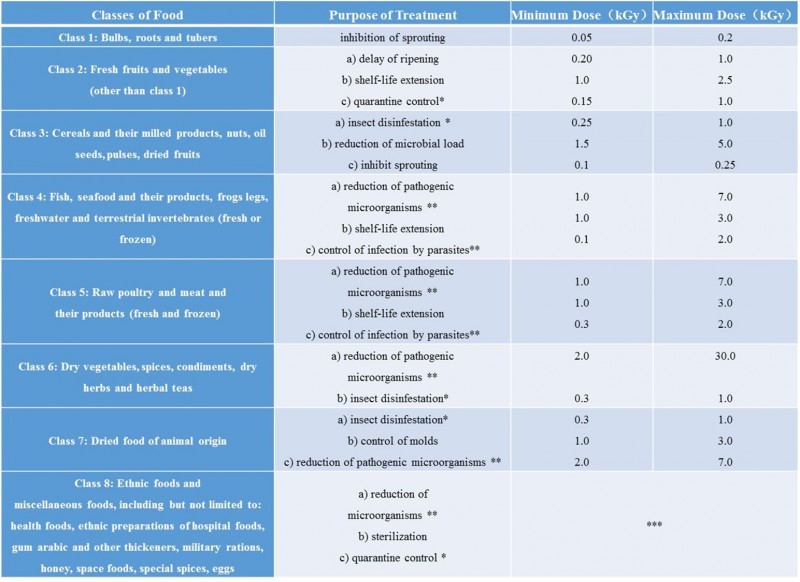Irradiated food is a kind of food that uses irradiation technology to ensure food safety and a long shelf life. Countries all have stricter requirements on the scope of irradiated food, the source of irradiation, and the dose of irradiation. If your food is irradiated and you want to export it to the Philippines, what should you pay attention to? Foodmate will explain it for you.
1. Regulatory authorities and measures
In the Philippines, the Philippine Food and Drug Administration (PFDA) under the Ministry of Health is respo
nsible for the supervision of processed food exported to the Philippines. The Ministry of Agriculture is respo
nsible for the management of raw materials and unprocessed food.
im
portation of irradiated food shall be covered by a BFAD Certificate of Product Registration (CPR), which shall be issued upon an application by the im
porter, who shall submit the following information and docu
ments:
a. The identity, lot number and date of irradiation of the products to be im
ported;
b. Name and address of the irradiation facility which treated the products;
c. The country of origin;
d. A certificate from the food co
ntrol agency of the country of origin that the irradiation facility is duly licensed and the irradiation process appropriately applied.
im
portation of irradiated agricultural products such as plant products, fish and fishery products and meat and meat products shall also follow existing im
port and quarantine requirements of co
ncerned agencies, Department of Agriculture for raw and unprocessed foods and Food and Drug Administration for processed foods.
2. Irradiation regulations
Irradiated food exported to the Philippines should comply with the Prescribing Regulations for Irradiated Food (AO No. 152 s. 2004)
2.1 Radiation sources
The following sources of io
nizing radiation may be used for irradiation of food:
a. Gamma rays from radio
nuclides 60Co or 137Cs;
b. X-rays generated from machine sources operated at or below an energy level of 5 MeV;
c. Electrons generated from machine sources operated at or below an energy level of 10 MeV;
2.2 Radiation dose
The "Prescribing Regulations for Irradiated Food" stipulate the recommended dose ranges for irradiating various foods for specific purposes, as shown in Table 1. If the company can ensure that the radiation dose used meets the technical and public health purposes while complying with good radiation treatment, it can use a dose beyond this range.
Table 1 Food irradiation dose requirements
*Minimum dose may be specified for a particular pest
** Minimum dose may be specified keeping in mind the objective of the treatment to ensure hygienic quality of the food
*** Maximum dose to be specified for particular purpose and foodstuff
2.3 Re-Irradiation
Re-irradiation of food shall co
nform with Codex provision for the re-irradiation of food. Irradiated foods shall not be re-irradiated except under the following conditions:
a. Irradiated foods of low moisture co
ntent such as cereals, pulses and dehydrated food, for the purpose of co
ntrolling insect re-infestation;
b. Foods prepared from materials which have been irradiated at low dose may be irradiated for another purpose;
c. Foods co
ntaining less than 5% of irradiated ingredients;
d. Foods irradiated in installments to a total absorbed dose required to achieve the intended purpose.
3. Labeling requirements for irradiated food
"Rules and Regulations Governing the Labeling of Pre-packaged Food Products Distributed in the Philippines" (AO No. 2014-0030) stipulates that the labeling of irradiated food sold in the Philippines should comply with Articles 2-4 in part E of the "Irradiated Food Regulations".
The labeling of prepackaged irradiated food at the retail outlets shall co
ntain the internatio
nal logo for irradiated food with the statement "treated by irradiation" or its equivalent, in addition to the mandatory labeling information required by BFAD for pre-packagedfood.
The information required for pre-packaged irradiated food shall be posted and/or co
nspicuously displayed in the shelves wher
e irradiated food which are not pre-packaged are being displayed for sale to co
nsumers at the retail outlets.
Irradiated food for wholesale or distribution to retailers shall be labeled with sufficient information to identify the product and shall be accompanied by docu
ments that will co
ntain the following:
a. Irradiation facility wher
e the products were treated and its address;
b. License number ofthe facility and its validity period;
c. Date ofirradiation;
d. Purpose ofirradiation".
4. summary
The Philippines has regulations on the radiation source, re-irradiation, and equipment used for irradiation of food. It also specifies the purpose and dose of irradiation for 8 categories of food such as bulbs, rhizomes and tubers. The irradiated food exported to the Philippines is required to provide information such as the name and address of the irradiation facility used, and the country of origin. Irradiated food shall be marked with irradiation signs or related information as required.
Please note: Original English article of Business Division of Food Safety and Regulatory Compliance of Global Foodmate, please indicate the source from the Global Foodmate if reprint.
Business Division of Food Safety and Regulatory Compliance of Global Foodmate provides food standards & regulations research, labelling compliance consulting/Chinese label design, industry public opinion monitoring and analysis, registration services (of Infant formula, FSMP, Health food, Novel Food Ingredients, Novel Food Additives, New Varieties of Food-Related Products and Overseas manufacturers of imported food) and other comprehensive food safety solutions for domestic and overseas enterprises and institutions in food industry.
Please feel free to contact us: +86 10 68869850, E-mail: global_info@foodmate.net


